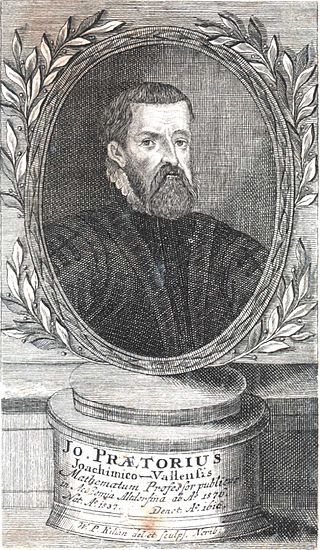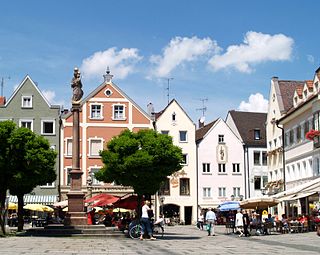Related Research Articles

Peine is a town in Lower Saxony, Germany, capital of the district Peine. It is situated on the river Fuhse and the Mittellandkanal, approximately 25 km (16 mi) west of Braunschweig, 27 km (17 mi) northeast of Hildesheim, and 40 km (25 mi) east of Hanover.

Friedrich Martin von Bodenstedt was a German author.

Regat Germans or Old Kingdom Germans are an ethnic German group of the eastern and southern parts of Romania. The Regat is a Romanian-language term ascribed for the initial territorial extent of the Kingdom of Romania before World War I, roughly the regions of the current state of Romania to the south and east of Transylvania.

Johannes Praetorius or Johann Richter was a Bohemian German mathematician and astronomer.
Hartmut Boockmann was a German historian, specializing in medieval history.

Ingeborg Bronsart von Schellendorf was a Finland-Swedish and German composer.

The Brunswick Lion is a medieval sculpture, created in bronze between 1164 and 1176, and the best-known landmark in the German city of Brunswick. The Brunswick Lion was originally located on the Burgplatz square in front of the Brunswick Cathedral. The monument was moved to Dankwarderode Castle in 1980, and later replaced at the original location by a replica. Within Brunswick, it is commonly known as the "Castle Lion" (Burglöwe).

Weilheim in Oberbayern is a town in Germany, the capital of the district Weilheim-Schongau in the south of Bavaria. Weilheim has an old city-wall, historic houses and a museum.
Wilhelm Nestle was a German philologist and philosopher.

Helmut Müller-Enbergs is a German political scientist who has written extensively on the Stasi and related aspects of the German Democratic Republic's history.

The Soest Feud, or Feud of Soest, was a feud that took place from 1444 to 1449 in which the town of Soest claimed its freedom from Archbishop Dietrich of Cologne (1414–1463), who tried to restore his rule. The town of Soest opposed this attempt on 5 June 1444 by accepting a new suzerain, John I, the Duke of Cleves-Mark, who guaranteed the town its old rights as well as new ones. As a result Emperor Frederick III imposed the imperial ban on the town. The victory of the town meant that Soest had de facto more freedom than a free imperial city until it was annexed by Prussia, but at the same time it had to forfeit its economic power because it was now an enclave within Cologne's territory.
Gerhard Ammerer is an Austrian historian and professor at the University of Salzburg.
Rudolf Bülck was a German librarian.
Michael Maaser is a German historian, archivist of the Goethe University Frankfurt.
Bodo Balthasar von Dewitz was a German art historian. His work focused on historical photography.

The County of Steinfurt, originally the Lordship of Steinfurt, was a historic territory of the Holy Roman Empire in the Munsterland. It existed from roughly 1100 until 1806.

Mainz Charterhouse is a former Carthusian monastery, or charterhouse, in Mainz, Rheinland-Pfalz, Germany, demolished in 1790–1792 but still marked by the street-name "Karthaus".
Hans Michael Finger was a German teacher and head of the district home office in Peine.

During World War II, Düsseldorf was heavily destroyed by Allied aerial bombardment. The most severe attack occurred on June 12, 1943, when a firestorm was ignited through targeted bombing by the British Royal Air Force, largely destroying the historical city center, downtown, and other adjacent neighborhoods.
Irene Stoehr was a German feminist historical social scientist and journalist. Her main research interests were the feminist movement and gender history in the 20th century.
References
- ↑ "Das Gedächtnis der Stadt Peine geht in den Ruhestand". hallowochenende.de (in German). February 15, 2019. Retrieved March 24, 2023.
plaudert der heute 66-Jährige über die Anfänge.
- 1 2 3 4 5 Bolte, Kathrin (February 13, 2019). "Stadtarchiv Peine: Leiter Michael Utecht geht in den Ruhestand". .paz-online.de (in German). Retrieved March 24, 2023.
- ↑ Hans-Peter Bolm (2020). Heinrich Habenicht Hauptamtlicher Feuerwehrführer 1938-1945 in Peine. Vom Luftschutz zur Feuerwehr. Norderstedt: Books on Demand. p. S. 36. ISBN 978-3-7504-0379-6.
- ↑ Bolte, Kathrin (April 16, 2019). "200 Jahre Friedrich von Bodenstedt: Briefe erzählen aus seinem Leben". paz-online.de (in German). Retrieved March 24, 2023.
- ↑ Schildener, Frank (April 16, 2019). "Bodenstedts Briefe erscheinen als Quellenedition". Wolfenbüttel Magazin (in German). Retrieved March 24, 2023.
- ↑ press information, Stadt Peine, 21 April 2014 (German)
- ↑ Meta data at peine.de